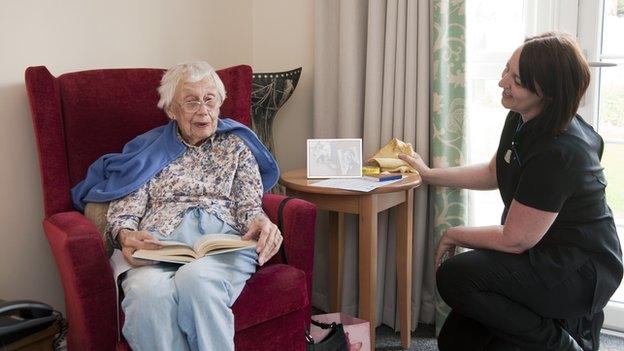Social care - the biggest challenge over this parliament?
- Published

It is easy to be cynical about companies who do business with the public sector warning of dire consequences if their income is not increased.
Some might see the claim by care home operators that there could be a "catastrophic collapse" because of the higher costs associated with the National Living Wage in such a light.
The residential care providers might be accused in some quarters of crying wolf after their warnings that homes might close if ministers don't agree to fund increases in the bills paid by local authorities.
They have written to the Chancellor George Osborne just weeks after a similarly worded missive from the UK Homecare Association, which represents providers of social care to people in their homes.
And yet... There is a sense that the latest warning letter is reflecting deeper problems in the world of social care.
Care home operators have complained for some time that their finances have been severely squeezed because of cuts in real terms in the fees paid by local authorities on behalf of elderly residents.
Staff wages account for about 60% of their total costs, so any pay hike will have a significant impact on each business.
Increases in costs, such as higher wages, can be passed on in the shape of higher fees to residents who pay for some or all of their care.
But that's not possible for places wholly funded by local authorities - which account for nearly 40% of the total at the five care home companies which wrote the letter.

BBC Cost of Care project

The BBC has launched an online guide to the care system for the over-65s. The "care calculator" covers both residential care and the support provided in people's own homes, for tasks such as washing and dressing.
Users can submit their postcode and find out how much each service costs where they live in the UK.
There is also a dedicated BBC Cost of Care website with news stories, analysis and video.

Challenging role
That has led to the operators' demand that central government should provide ring-fenced funding for councils to raise their fees.
The backdrop to this argument is the ageing population and the changing role of residential care homes.
A few decades ago they fulfilled the role of "retirement homes" with mostly healthy residents.
Now with the prevalence of dementia and people living longer, often with multiple conditions, care homes have a more challenging role in society.
How they are resourced is an important policy issue. The division between health, funded by central government, and social services run by local councils is widely regarded as out-dated and inappropriate for the 21st century.
While NHS funding was a dominant issue in the election campaign, little was heard from national politicians about the state of social care.

The central issue is the quality of care elderly people receive in homes
Labour criticised the coalition for cuts in social care funding in England over the last parliament but the argument did not seem to resonate in the same way as the repeated spats over "billions more for the NHS" pledges.
Quality of life issue
Since polling day, a commitment to introduce reforms proposed by the commission headed by the economist Andrew Dilnot has been shelved until 2020.
These included a lifetime cap on care costs, limiting an individual's liability and reducing the need to sell a family home to pay the bills.
A widely praised reform plan was seen to have been postponed because of the immediate problems with social care funding.
This is, of course, ultimately about the quality of life of the elderly.
About 400,000 of them in England are looked after in care homes.
The residential home operators are warning of closures and - even if that proves to be exaggerated - it's hard to see where the funding for improved or better quality care will come from.
The response from the government to the letter has been muted.
Apart from noting that the National Living Wage will benefit tens of thousands of workers in social care, a spokesperson said the funding issue would be considered in the Chancellor's spending review later this year.
At a time of continued spending restraint, its difficult to identify where significant extra investment in social care will come from.
As Chris Ham of the King's Fund think-tank put it on the BBC Radio 4 Today programme: "Unless there's a sea change between now and the spending review, the prospects for adult social care, publically funded, for the most vulnerable in society, are pretty bleak."